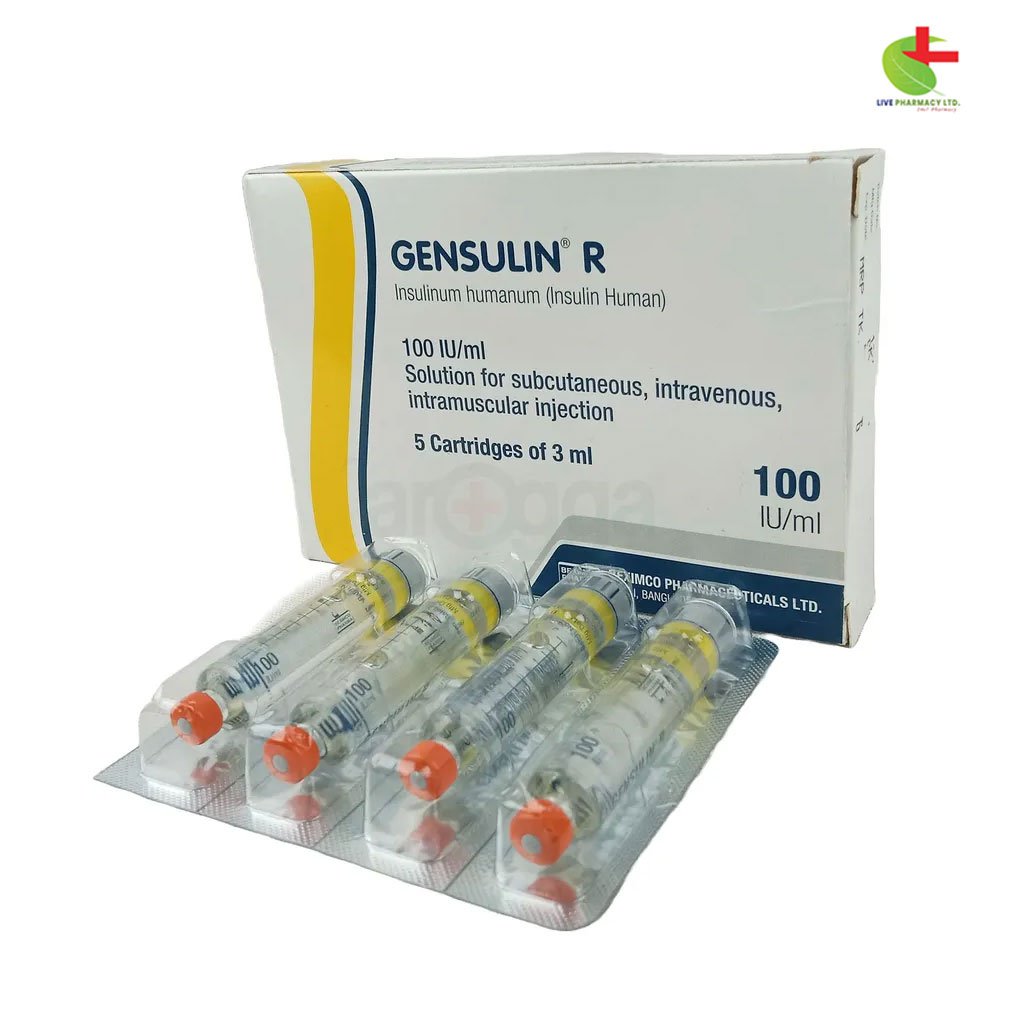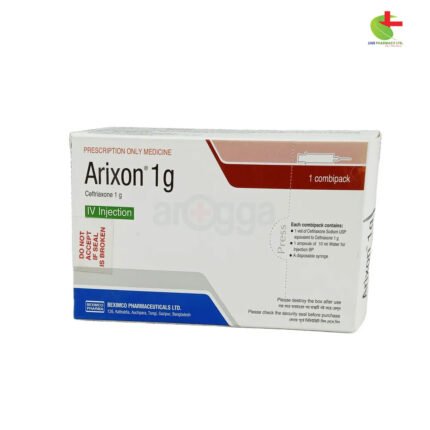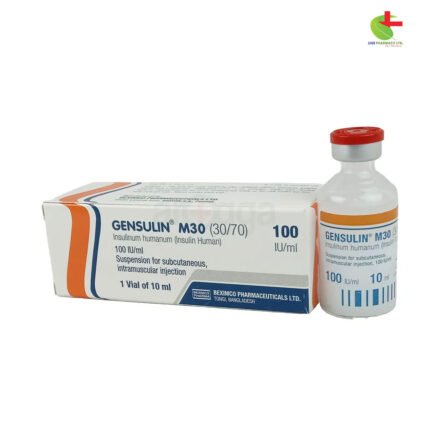Gensulin R Cartidge
222.00৳ Injection - (100IU/ml)
- Gensulin R Injection is a fast-acting insulin used for managing type 1 and type 2 diabetes, including during periods of stress and in gestational diabetes.
- It comes in various concentrations and provides rapid glucose control with an onset of action within 30 minutes and a duration of 4-6 hours.
- Administered subcutaneously, it is crucial to rotate injection sites to prevent lipodystrophy.
- Safe for use during pregnancy and lactation, but requires careful dosage adjustments and monitoring.
 Brand
Brand
|
Beximco Pharmaceuticals Ltd |
|---|---|
 Generics
Generics
|
Insulin Human [rDNA] |
 Type
Type
|
Indications
Gensulin R Injection is prescribed for:
- Managing type 1 diabetes in all patients.
- Treating type 2 diabetes in patients whose condition is not sufficiently controlled by diet or oral hypoglycemic agents.
- Initial stabilization of diabetes in cases of diabetic ketoacidosis, hyperosmolar non-ketotic syndrome, or during stress conditions like severe infections or major surgery.
- Addressing gestational diabetes.
Composition
- Insulin Human R (40 IU/ml): Each milliliter contains 40 IU (1.388 mg) of Insulin Human (rDNA) USP as Soluble Insulin Human (Regular).
- Insulin Human R (100 IU/ml): Each milliliter contains 100 IU (3.47 mg) of Insulin Human (rDNA) USP as Soluble Insulin Human (Regular).
- Insulin Human N (40 IU/ml): Each milliliter contains 40 IU (1.388 mg) of Insulin Human (rDNA) USP as Isophane Insulin Human.
- Insulin Human N (100 IU/ml): Each milliliter contains 100 IU (3.47 mg) of Insulin Human (rDNA) USP as Isophane Insulin Human.
Pharmacology
Gensulin R is a sterile, clear, and colorless solution of Insulin Human. It is a rapid-acting insulin with a short duration compared to other insulin types and can be used alongside long-acting insulins. Insulin works by facilitating glucose uptake into muscle and fat cells and inhibiting glucose production in the liver.
- Onset of Action: Within 30 minutes
- Peak Plasma Levels: Between 1-3 hours
- Duration of Action: Approximately 4-6 hours
Dosage
Dosage is tailored to individual patient needs as determined by a physician. Typical daily insulin requirements for type 1 diabetes range from 0.5 to 1.0 IU/kg, with pre-pubertal children usually requiring 0.7 to 1.0 IU/kg. Requirements may be higher in insulin-resistant conditions or lower during partial remission. Initial dosages for type 2 diabetes generally start at 0.3 to 0.6 IU/kg/day.
A meal or snack containing carbohydrates should follow each injection within 30 minutes.
Administration
- Method: Administered subcutaneously, primarily in the abdominal wall, but can also be injected into the thigh, gluteal region, or deltoid region.
- Site Rotation: To prevent lipodystrophy, rotate injection sites within the same anatomical area.
- Other Methods: Intramuscular and intravenous administrations are possible under medical supervision.
Dosage Adjustment
- Increased Requirement: Illnesses, infections, or fever can increase insulin needs.
- Decreased Requirement: Renal or hepatic impairment may reduce insulin needs.
- Adjustment Factors: Changes in physical activity, diet, or insulin type may necessitate dosage adjustments.
Interactions
- Reduced Insulin Requirements: Oral hypoglycemic agents, MAO inhibitors, non-selective beta-blockers, ACE inhibitors, salicylates, and alcohol.
- Increased Insulin Requirements: Thiazides, glucocorticoids, thyroid hormones, beta-sympathomimetics, growth hormone, and danazol.
- Beta-Blockers: May mask hypoglycemia symptoms and delay recovery.
- Octreotide/Lanreotide: Can either increase or decrease insulin requirements.
- Alcohol: Can intensify and prolong the hypoglycemic effect.
Contraindications
Gensulin R should not be used in patients with hypoglycemia or hypersensitivity to human insulin or any other components.
Side Effects
Common side effects include hypoglycemia, which is dose-dependent, and lipodystrophy at injection sites if site rotation is neglected. Generalized hypersensitivity reactions and transient edema may also occur.
Pregnancy & Lactation
Insulin use is generally safe during pregnancy as it does not cross the placenta. Insulin needs usually decrease in the first trimester and increase during the second and third trimesters. Post-delivery insulin needs revert to pre-pregnancy levels. Insulin treatment is safe during lactation but may require dosage adjustments.
Precautions & Warnings
- Inadequate dosing or discontinuation, especially in type 1 diabetes, can lead to hyperglycemia and potentially life-threatening diabetic ketoacidosis.
- Hypoglycemia risk increases with excessive insulin dosage.
- Changing insulin types or brands requires careful medical oversight.
- Consult a doctor before traveling across time zones as this may impact insulin and meal timings.
Overdose Effects
- Mild Hypoglycemia: Treated with oral glucose or sugary products.
- Severe Hypoglycemia: Requires glucagon (0.5 to 1 mg) or intravenous glucose administered by medical professionals. Oral carbohydrates should be given upon regaining consciousness to prevent relapse.
Therapeutic Class
Medium Acting Insulin
Storage Conditions
Store Gensulin R between 2°C and 8°C in a refrigerator. Avoid using frozen preparations. Protect from light and excessive heat or sunlight. Once in use, the vial can be kept for up to 6 weeks below 25°C or 4 weeks below 30°C, and should not be refrigerated.













Reviews
There are no reviews yet.